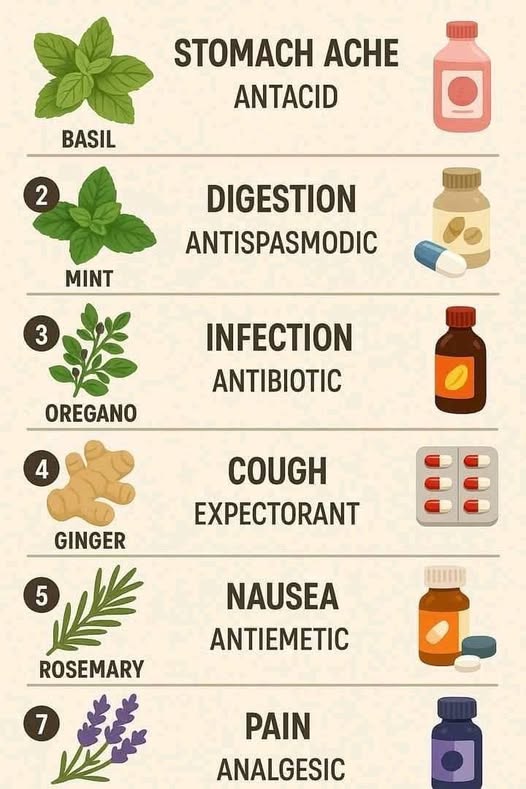Some Herbs Work Magic: Natural Remedies for Common Ailments
Nature has long been the original pharmacy, offering powerful solutions in the form of herbs that help treat a wide variety of ailments. From relieving pain to soothing digestive issues, certain herbs have proven to be more than just flavorful additions to meals — they are natural healers. Below, we explore seven potent herbs and their time-tested benefits, backed by both tradition and modern science.
1. Basil – Natural Relief for Stomach Ache and Acid Reflux
Basil isn’t just a delicious topping for your pasta; it’s a potent antacid with soothing effects on the digestive system.
How It Works:
Basil leaves are rich in eugenol, a compound that has been found to balance stomach acid levels and calm irritated stomach linings. It can ease symptoms of gastritis, acid reflux, and general stomach discomfort.
How to Use:
- Chew 4-5 fresh basil leaves after meals to naturally prevent acid build-up.
- Brew a basil tea by boiling 1 teaspoon of dried or fresh basil leaves in a cup of water. Sip slowly to relieve stomach cramps and indigestion.
2. Mint – Your Go-To Herb for Digestion and Bloating
Mint has been used across cultures as a natural digestive aid. Its antispasmodic properties make it especially effective for easing gas, bloating, and intestinal cramps.
How It Works:
Menthol, the primary component in mint, helps relax the muscles of the digestive tract, promoting smoother movement of food and reducing the painful spasms of the intestines.
How to Use:
- Chew on a few fresh mint leaves after eating to refresh the breath and calm the gut.
- Prepare mint tea by steeping a handful of mint leaves in boiling water for 5–10 minutes. Drink this warm or chilled.
3. Oregano – A Powerful Natural Antibiotic
More than just a pizza topping, oregano boasts strong antimicrobial and antifungal properties. It’s rich in compounds like carvacrol and thymol, which are known to fight off bacterial infections.
How It Works:
Oregano acts as a natural antibiotic, effective against various pathogens including E. coli, Salmonella, and Candida. It boosts the immune system and assists in detoxifying the body.
How to Use:
- Add fresh or dried oregano to soups, stews, or salads.
- For internal cleansing, steep 1 teaspoon of dried oregano in hot water and drink as tea. This can be taken up to twice daily for immune support.
4. Ginger – Soothing Coughs and Clearing Congestion
Ginger is a legendary remedy for respiratory issues, particularly coughs, sore throats, and congestion. It works as a natural expectorant, helping to clear mucus and soothe irritation.
How It Works:
Ginger contains gingerol, a potent anti-inflammatory that also stimulates circulation, reduces mucus build-up, and combats bacteria and viruses.
How to Use:
- Slice fresh ginger (about 1–2 inches), boil in 2 cups of water, and add a tablespoon of honey and lemon juice. Drink warm.
- Take ginger tea 2–3 times daily during cough or cold for optimal relief.
5. Rosemary – Combating Nausea and Motion Sickness Naturally
With its woodsy aroma and sharp flavor, rosemary is more than a culinary herb. It’s a powerful antiemetic, excellent for nausea, dizziness, and motion sickness.
How It Works:
The active compounds in rosemary, including cineole and camphor, have been shown to positively influence the central nervous system, improving mood and relieving gastrointestinal distress.
How to Use:
- Inhale rosemary essential oil using a diffuser or by adding a few drops to a tissue.
- Steep rosemary leaves in hot water to make tea; sip before or during travel to prevent motion sickness.
6. Lavender – A Natural Analgesic for Pain Relief
Famed for its calming aroma, lavender is widely used as a natural pain reliever. It helps ease headaches, body aches, muscle tension, and stress-induced pain.
How It Works:
Lavender contains linalool and linalyl acetate, compounds known to relieve tension and improve blood circulation, which reduces inflammation and soothes pain.
How to Use:
- Apply lavender essential oil (diluted with a carrier oil) to temples, neck, or sore muscles.
- Diffuse lavender oil or inhale directly for immediate tension and headache relief.
7. Turmeric – The Golden Healer for Inflammation
Dubbed the “golden spice,” turmeric is a powerhouse herb with profound anti-inflammatory and antioxidant properties. It’s a go-to remedy for joint pain, arthritis, inflammatory bowel disease, and more.
How It Works:
The magic lies in curcumin, the primary bioactive compound in turmeric. It helps block the activity of inflammatory molecules like NF-kB, effectively lowering inflammation throughout the body.
How to Use:
- Mix 1 teaspoon of turmeric powder in a glass of warm milk (golden milk) with a dash of black pepper (for better absorption).
- Add turmeric to meals, smoothies, or teas to get its benefits daily.
Why Incorporate These Healing Herbs into Your Life?
Harnessing the natural power of herbs is not just a tradition — it’s a science-backed approach to managing everyday health issues. These herbs provide side-effect-free relief while offering additional benefits like immune support, stress reduction, and enhanced digestion.
By consistently integrating these herbs into your lifestyle — whether through teas, essential oils, or meal preparation — you support your body’s natural healing processes and reduce dependence on synthetic medications.
Conclusion: Let Nature Be Your First Medicine
When used with intention and consistency, these seven herbs serve as potent allies in maintaining wellness and preventing illness. They are accessible, affordable, and time-tested — the kind of everyday magic our bodies deserve.
